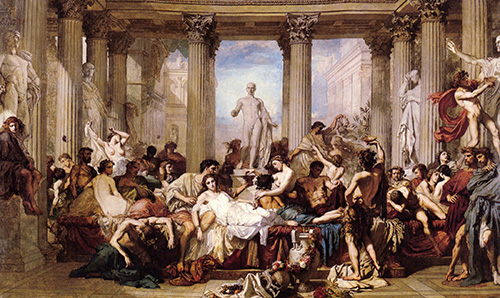Koenraad Swart, The Sense of Decadence in Nineteenth Cntury France
In most periods of history poets and novelists have inveighed against the evils of their times. But at the end of
Thomas Couture, Romans during the Decadence (1847) |
the nineteenth century the corruption of society was more than a favorite theme, it became an obsession. Realistic and naturalistic novelists portrayed the degenerations of their age in the most somber colors and authors belonging to the Decadent and Symbolist movements took an even gloomier view of the world in which they lived. . .
Many contemporaries explained the pessimism of the younger literary generation by the painful experiences of the année terrible ["the terrible year," i.e.1870-1871 and the following disenchantment with the Third Republic. "Nous sommes entrés dans la vie," wrote Paul Bourget, "par cette terrible année de la guerre et de la Commune, et cet année terrible n'a pas mutile que la carte de notre cher pays; ... quelque chose nous en est demeuré, à tous, comme un premier empoisonnement qui nous a laissés plus dépourvus, plus incapables de résister a la maladie intellectuelle ou il nous a fallu grandir."["We entered life through this terrible year of war and the Commune, and this terrible year not only mutilated the map of our dear country . . .these things stayed with us all, like a first poisoning that left us weakened, less capable of resisting the intellectual malady when we must be stronger."] Many young Frenchmen, according to another literary critic, Jules Lemaitre, had been so disturbed by the misfortunes of their country that their hearts had been filled with a fund of bitterness that made them incapable of the exuberance and gaiety of their elders.
But the despondency of many French men of letters was more than a specific response to the political misfortunes of their country. It was not in France alone that a profound melancholy pervaded much of the literary production at the end of the nineteenth century.
As Romantic gloom, with which it had much in common, the pessimism of the fin de siécle was a European-wide phenomenon that should -- rather be seen as a renewed protest on the part of highly sensitive minds against the complacency and vulgarity of their contemporaries and as a form of anxiety about the loss of religious assurances.
The new sense of decadence was not an exact replica of the old Romantic despair. At the end of the nineteenth century many men of letters went even further than their predecessors in proclaiming the degeneracy of modern civilization. "Je suis un homme ne sur le tard ' d'une race," ["I am a man from the last hours of a race."] sang Paul Bourget in his early years.1 In a similar vein Paul Verlaine proclaimed: "Je suis l'Empire a la fin de la decadence."2 [I am the (Roman) Empire at the end of the decadence."]
